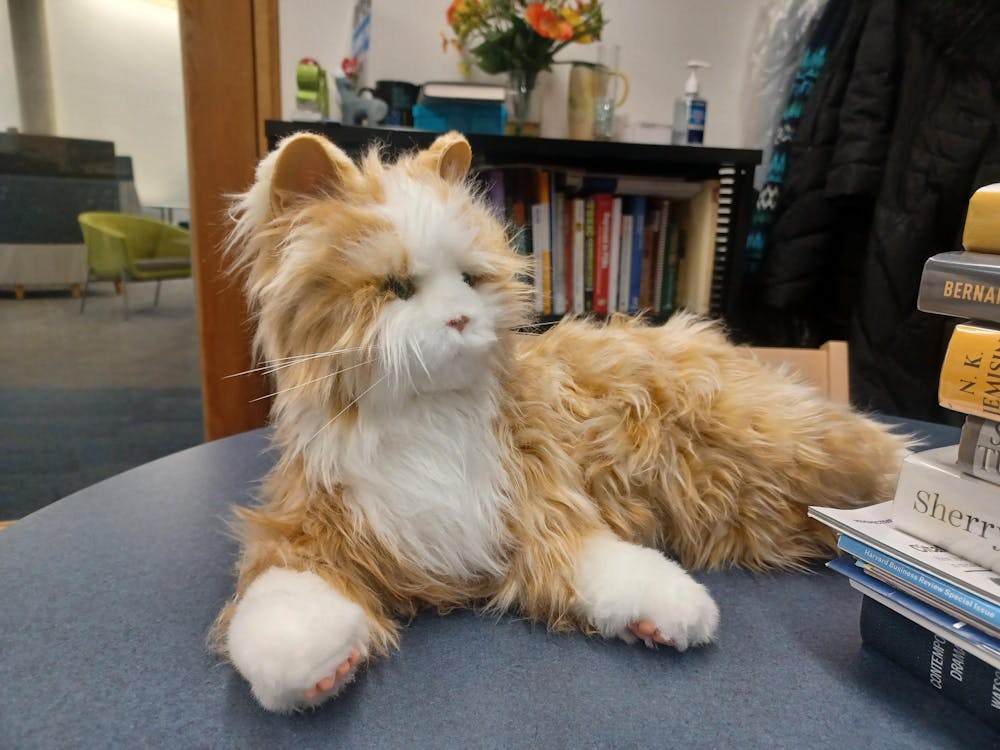Since September 2024, the Cushwa-Leighton Library at Saint Mary’s College has been providing a new initiative for students to adjust to the library’s resources and understand the technology that it has, including through a workshop that includes robot pets.
Susan Wiegand, the scholarly communications librarian, has been the principal individual who has applied and facilitated the initiative for students to consider the ethics of having surrogate pets.
“We wanted to bring more students into the library earlier in their academic careers, and I was trying to think of a way that would be fun in bringing people into the library. So, I came up with this idea of robot pet companions from articles that I had read … It's a way of getting people to come in and discuss the new kinds of things that you can do with technology that would still be human centered,” Wiegand said.
This workshop is part of the “You Belong in the Library” grant from the Private Academic Library Network of Indiana (PALNI) for students to feel more adjusted and be less hesitant about materials and programs that the library offers.
“It's all related to this program, which really is focusing on making sure students are comfortable using the library, especially students who might not have started off feeling comfortable about [it] … So the theme is that you belong here. We just want to make sure that everybody understands that it's a very welcoming environment,” library director Joe Thomas said.
Wiegand explained more about what the library plans to do throughout the duration of this grant, including increasing more diverse art.
“It goes until summer of 2025, so we still have the semester to go, but the first work stream is to bring more diverse art into the library, so that people feel more welcome and represented … I thought why don't we have more women in the library? Why don't we have women scholars, women scientists, women lawyers, judges and astronauts … that we could be using to put around the library and make people feel more at home,” Wiegand stated.
The project also aims to explore the psychological effects robot pets can have on humans, and if they are effective.
“It's both a way to attract people in because it's kind of this unique and fun thing, but it's also the it's gives students a chance to participate in the actual study of how these sort of surrogate pets work with people in a psychological way. Is it good for them? Does it help them feel more comfortable in certain settings,” Thomas said.
Being able to interact with the robots and workshops itself are part of the experience for students to feel more accommodated in the library and further understand how to interpret scholarly works while creating their own research. Student peer mentors assist students throughout the workshop for hands-on activities.
“What I’m trying to do is make it more student centered, so that I have peer mentor students that I am hiring and they are the ones who actually interact with the students. They're bringing the robots over to the student center and working with students in the workshops, because I want students to be leading this and talking to each other and saying, ‘this is the advantage working, coming to the library and getting your resources,’” Wiegand said.
As of Nov. 1, 2024, the academic repository has been added as a third stream of the grant for interested students to have their scholarly works be saved and inputted to, along with having a pathway towards getting their works published.
Jill Hobgood, the reference and rare books librarian, hopes that students are able to come into the library and explore more of the programming and collections that the library offers to students.
“I hope that they will see the library as a welcoming place where there are people who can help them with the research or even their interests, regardless of what that might be. There's a librarian here for you and we cover a lot of ground, not just traditional books,” Hobgood said.










